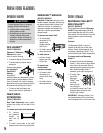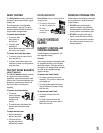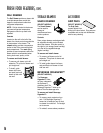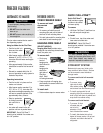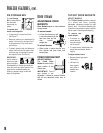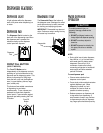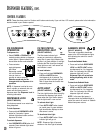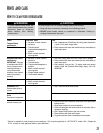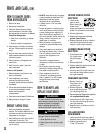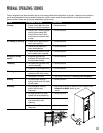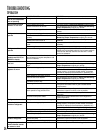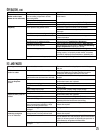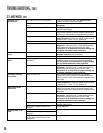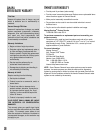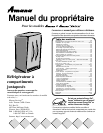
22
How to remove odors
from refrigerator
1. Remove all food.
2. Disconnect refrigerator.
3. Clean the following items–paying
special attention to crevices–using
the appropriate instructions in How to
Clean Your Refrigerator:
➢ Walls, floor, and ceiling of cabinet
interior.
➢ Drawers, shelves, and gaskets.
4. Wash and dry all bottles, containers,
and jars. Discard spoiled or expired
items.
5. Wrap or store odor-causing foods in
tightly-sealed containers to prevent
reoccurring odors.
6. Connect power to refrigerator and
return food.
7. After 24 hours, check if odor has
been eliminated.
If odor is still present...
1. Remove drawers and place on top
shelf of refrigerator.
2. Pack refrigerator and freezer
sections–including doors–with
crumpled sheets of black and white
newspaper.
3. Place charcoal briquettes randomly
on crumpled newspaper in both
freezer and refrigerator
compartments.
4. Close doors and let stand 24–48 hours.
5. Repeat steps 5 through 7 above.
Energy saving ideas
➢ Avoid overcrowding refrigerator
shelves. This reduces effectivity of air
circulation around food and causes
refrigerator to run longer.
➢ Avoid adding too much warm food to
refrigerator at one time. This
overloads compartments and slows
rate of cooling.
➢ DO NOT use aluminum foil, wax paper,
or paper toweling as shelf liners. This
decreases air flow and causes
refrigerator to run less efficiently.
➢ A freezer that is
2
⁄3 full runs most
efficiently.
➢ Locate refrigerator in coolest part of
room. Avoid areas of direct sunlight,
or near heating ducts, registers, or
other heat producing appliances. If
this is not possible, isolate exterior by
using a section of cabinet or an
added layer of insulation.
➢ Refer to section on temperature
controls for recommended control
settings.
➢ Clean door gaskets as indicated in
the cleaning section every 3 months.
This will assure that door seals
properly and refrigerator runs
efficiently.
➢ Take time to organize items in
refrigerator to reduce time that door
is open.
➢ Be sure your doors are closing
securely by leveling refrigerator as
instructed in leveling section.
➢ Clean condenser coils off as
indicated in the cleaning section
every 3 months. This will increase
energy efficiency and cooling
performance.
To avoid personal injury or property
damage, observe the following:
➢ Allow light bulb to cool.
➢ Wear gloves when replacing light
bulb.
CAUTION
To avoid electrical shock which can
cause severe personal injury or death,
disconnect power to refrigerator
before replacing light bulb. After
replacing light bulb, connect power.
WARNING
How to remove and
replace light bulbs
UPPER FRESH FOOD
SECTION
1. Locate finger
gaps on each
side of clear light
shield. Insert
fingers and press in on each side of
shield. Pull shield down and remove.
2. Remove light bulbs.
3. Replace with appliance bulbs no
greater than 40 watts.
4. Replace light bulb cover by inserting
front tabs of light shield into slots
directly in front of light assembly.
LOWER FRESH FOOD
SECTION
1. Pinch bottom tabs
(A) on light cover
and pull straight
out.
2. Remove light bulb.
3. Replace bulb with appliance bulb no
greater than 40 watts.
4. Insert top tabs (B) of light cover into
liner slots and snap bottom portion
over light assembly.
FREEZER SECTION
1. Remove ice bin by
lifting front of bin
and pulling out.
2. Remove light bulb
cover by pinching top tab
(A) and pulling cover out.
3. Remove light bulb. Replace with appliance
bulb no greater than 40 watts.
4. Insert bottom tab (B) of light cover
into liner slots and snap top portion
over light assembly.
5. Replace ice bin by sliding in until bin
locks into place.
ICE AND WATER
DISPENSER
1. Locate light bulb inside top edge of
dispenser frame. Unscrew to remove.
2. Replace light bulb with a
7-watt, 120 volt bulb.
A
B
A
B
A
B
Hints and care,
cont.



